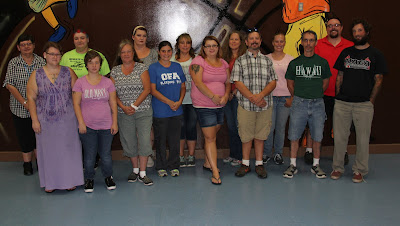POTSDAM
– This past spring Thomas Robarge was alone in his home when he fell down.
Unable to get back up or reach one of the three telephones in his home, he
spent two days laying on the floor of his apartment without food and water
clinging to hope that someone would find him before it was too late.
A
friend of his from the apartment complex where he lives did find him and called
911, setting into motion a series of events that would see Mr. Robarge spend
time at three different hospitals before coming to RiverLedge Health Care &
Rehabilitation Center in Ogdensburg.
“From
the information I received, the hospital didn’t think he would ever be able to
go back home,” said Occupational Therapist Alycia Dezell. “When he came here
the thought was to do some cognitive rehab and work on his hands and he’s done
great. I think he’s even surprised himself.”
It’s
been a rough 12 months or so for Mr. Robarge, who has little recollection of the
event leading to where he is today.
 |
| Occupational Therapist Alycia Dezell & Thomas Robarge |
“I
know that something happened in my apartment,” he said. “I remember falling
backwards and things being like they were in slow motion. I had three phones,
but I didn’t have enough strength to get to them or use them. I’m very lucky.”
According
to one of his five daughters, Danielle Rusk, Mr. Robarge had been experiencing
numbness in his hands for quite some time following a surgical procedure last
fall.
“This
is a person who was a fisherman. He was used to tying lures on lines and
baiting hooks. He started downhill skiing at 50 and rollerblading at 60. He was
a very strong man,” Mrs. Rusk said. “He was used to having his fine motor
skills, but he didn’t think he would ever have feeling in his hands again.
Whatever they did with him worked wonders.”
Although,
Mr. Robarge was never diagnosed with having a stroke, Ms. Dezell recognized
that many of the things he was experiencing were similar to what people
recovering from a stroke go through.
Using
some techniques she picked up during recent training to become a Certified Stroke
Rehabilitation Specialist, Ms. Dezell said Mr. Robarge was able to make
progress that surprised everyone.
“When
he first came in he used to fight Natalie and I all the time,” Ms. Dezell said,
referring to Physical Therapist Natalie Gilmour. “I think though after he
started to notice some improvements, he started to trust us and believe in the
program.”
“At
first I thought it was ridiculous, but then I noticed some improvements. We’re
not all the way there yet, but I’m hoping to get there,” he said.
When
asked what “all the way there” would be, Mr. Robarge, who said he used to ride
his bike for between 10 and 12 miles per day, is hoping to one day again get
back on his bike.
“I’m
happy to be going home. I’m looking forward to fishing again and one day
hopefully riding my bike again,” he said.
During
the course of his therapy, Mr. Robarge said there were a couple of turning
points, one involving a dog, and one involving a shoe.
Mrs.
Rusk who traveled to the area from her home in Georgia to be with her father
during his therapy and recovery brought her dog with her. Describing the dog as
soft and fluffy, she said that while her father had been able to pet the dog,
he did not understand how soft the dog’s fur was until one day when he was
petting the dog.
“I
could see the look on his face change,” Mrs. Rusk recalled. “Then he said, ‘Oh
my God, he is really soft.”
 |
| Just a few weeks ago, Mr. Robarge couldn't tie his own shoes. |
The
second turning point came when Mr. Robarge was again able to tie both of his
shoes.
“I
hadn’t been able to tie my left shoe in over a year, even going back to before
the surgery,” he said, as he leaned over from his chair and adjusted the laces
on his sneakers.
In
addition to regaining use of his hands, Mr. Robarge has also seen significant
improvements with his memory and other cognitive skills. He is now back at home
in his own apartment and after a period of adjustment and getting settled,
hoping to resume therapy in an outpatient setting and continue working towards
getting back on his bike.
“He
didn’t even want to have hope, but they just kept on him and would not let him
give up,” Mrs. Rusk said. “Our family is incredibly grateful for Alycia and the
entire staff at RiverLedge. They were all great.”
For more information on therapy services at RiverLedge
Health Care & Rehabilitation Center in Ogdensburg, contact (315) 393-0730.
For information on therapy services at Maplewood, contact (315) 386-4541.
You may also like United Helpers on Facebook or visit www.unitedhelpers.org.





